Whether I’m chopping ingredients or putting together a charcuterie board, I always reach for one of the best wood cutting boards. A good-quality cutting board is essential in every kitchen, and not only are wooden cutting boards more sustainable than plastic ones, but they’re also much more durable and sturdy, making it easy to prep all sorts of ingredients as you cook. I also love that they double as attractive serving trays when you’re hosting.
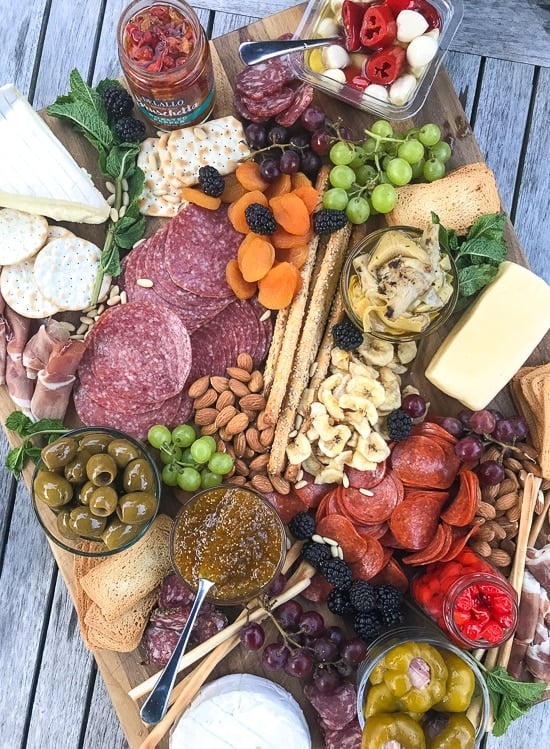
I cook for my family almost every day, so my own cutting boards get a lot of use, and I’ve also tried out many different cutting boards in my career. To help you find the best option for your kitchen, I’ve put together this list of the best wood cutting boards, and any of these picks will help make meal prep quicker and easier.
My Top Picks:
- What’s in My Kitchen: John Boos Wood Cutting Board – $133.95 at Target
- Best for Serving: John Boos Maple Wood Circular Cutting Board – $99.95 at Amazon
- Best Value: Teakhaus Edge-Grain Professional Cutting Board – $119.95 at Amazon
- Best End-Grain: Sonder Los Angeles End Grain Walnut Wood Cutting Board – $159.95 at Amazon
Reviews of The Best Wood Cutting Boards
1. What’s in My Kitchen: John Boos Wood Cutting Board
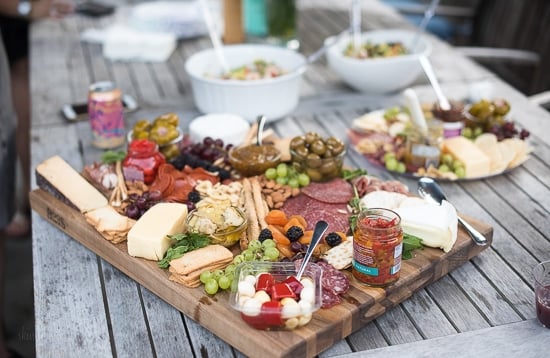
John Boos is one of the best-known brands of wooden cutting boards, and I love this sturdy, versatile option for chopping ingredients. The solid wood cutting board is spacious and thick, keeping it in place as you prep ingredients, and it’s available in either cherry or maple wood construction—you can’t go wrong either way, as they’re both extremely durable (and attractive) hardwoods.
In addition to providing a large cutting surface, this board has integrated handles on both ends, making it easy to pick up. You can chop on either side of the board thanks to its reversible design. It’s also easy to care for. Just wash it with soap and water after use and oil it every few weeks to keep the wood conditioned.
The Specs:
- Dimensions: 18 x 12 x 2.25 inches
- Weight: 4.5 pounds
- Material: Cherry or maple wood
- Grain: Edge-grain
The Pros:
- Multiple wood types
- Reversible
- Built-in handles
- Sturdy
The Cons:
What Others Are Saying:
The John Boos Wood Cutting Board has a 4.7-star rating from more than 2,000 Amazon reviewers, and it was named the best wooden cutting board by Forbes and Epicurious.
Buy the John Boos Wood Cutting Board:
2. Best for Serving: John Boos Maple Wood Circular Cutting Board

When I’m putting together a vegetable charcuterie board or crudité platter, I reach for this circular cutting board, as it’s the perfect size for serving a crowd. The round design is much lighter than other cutting boards, and it has handles that make it easy to carry from counter to table.
You can also use this cutting board for chopping ingredients, as it’s made from durable maple wood. The design is reversible, and one side has a juice groove that helps contain the mess if you’re carving a moist piece of meat. The only downside is that the round shape makes it a bit trickier to store, as it can’t be stood up on its side.
The Specs:
- Dimensions: 15 x 15 x 1.75 inches
- Weight: 1 pound
- Material: Maple wood
- Grain: Edge-grain
The Pros:
- Dual function
- Lightweight
- Reversible
- Integrated handles
- Juice groove
The Cons:
What Others Are Saying:
The John Boos Maple Wood Circular Cutting Board has a 4.3-star rating from 30 Amazon buyers.
Buy the John Boos Maple Wood Circular Cutting Board:
3. Best Value: Teakhaus Edge-Grain Professional Cutting Board
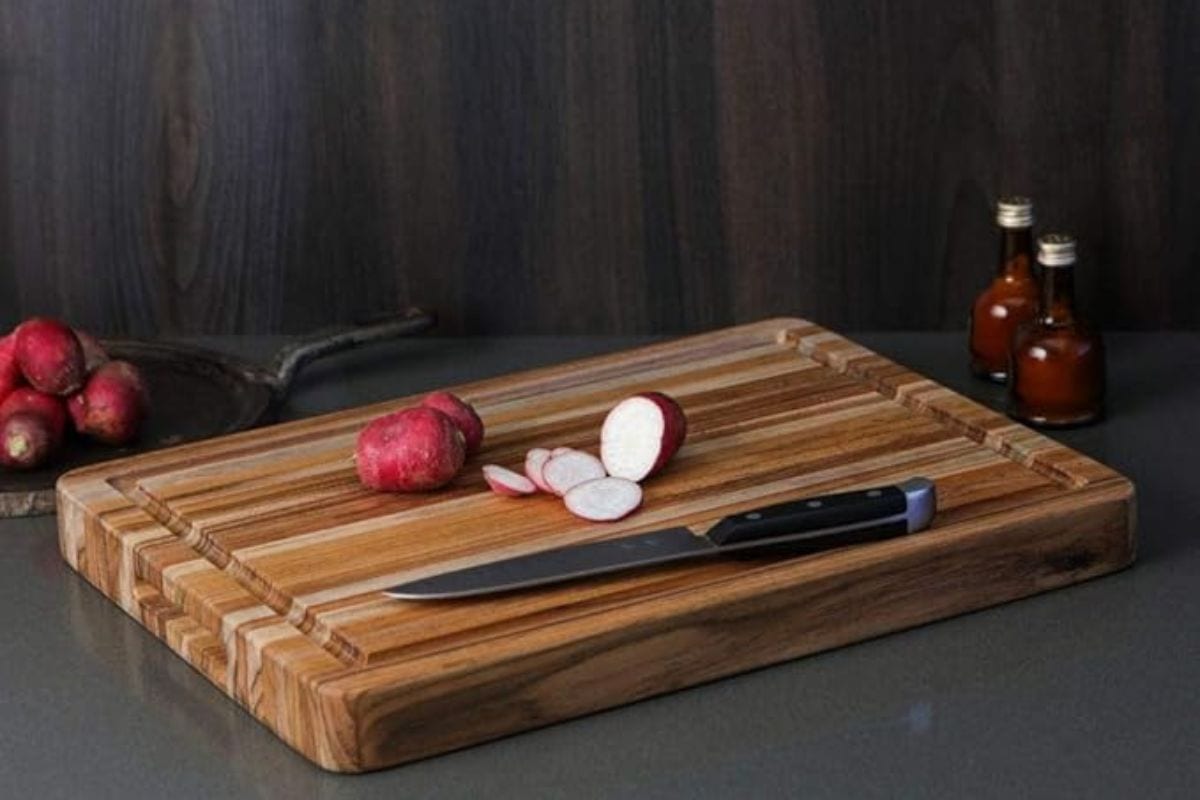
If you don’t want to spend too much on a cutting board but still want something high-quality, this teakwood option is sturdy and well-priced. It’s a little smaller than other cutting boards, but it still provides plenty of space for you to prep ingredients for cooking. The design has a deep juice groove that will capture any liquid from your food, keeping it from spilling onto the counter when you’re slicing steak. There are also handles carved in both ends, making it easy to lift.
Plus, teakwood is a bit softer than other types of hardwood, so it’s gentle on your knives, helping to maintain a sharp blade for longer.
The Specs:
- Dimensions: 16 x 12 x 1.5 inches
- Weight: 3 pounds
- Material: Teakwood
- Grain: Edge-grain
The Pros:
- Affordable
- Deep juice groove
- Built-in handles
- Gentle on knives
The Cons:
- Smaller than other boards
What Others are Saying:
The Teakhaus Edge-Grain Professional Cutting Board has a 4.5-star average rating from over 1,500 Amazon reviewers. It was also named the best wood cutting board by Wirecutter and the best low-maintenance cutting board by Forbes.
Buy the Teakhaus Edge-Grain Professional Cutting Board:
4. Best End-Grain: Sonder Los Angeles End Grain Walnut Wood Cutting Board
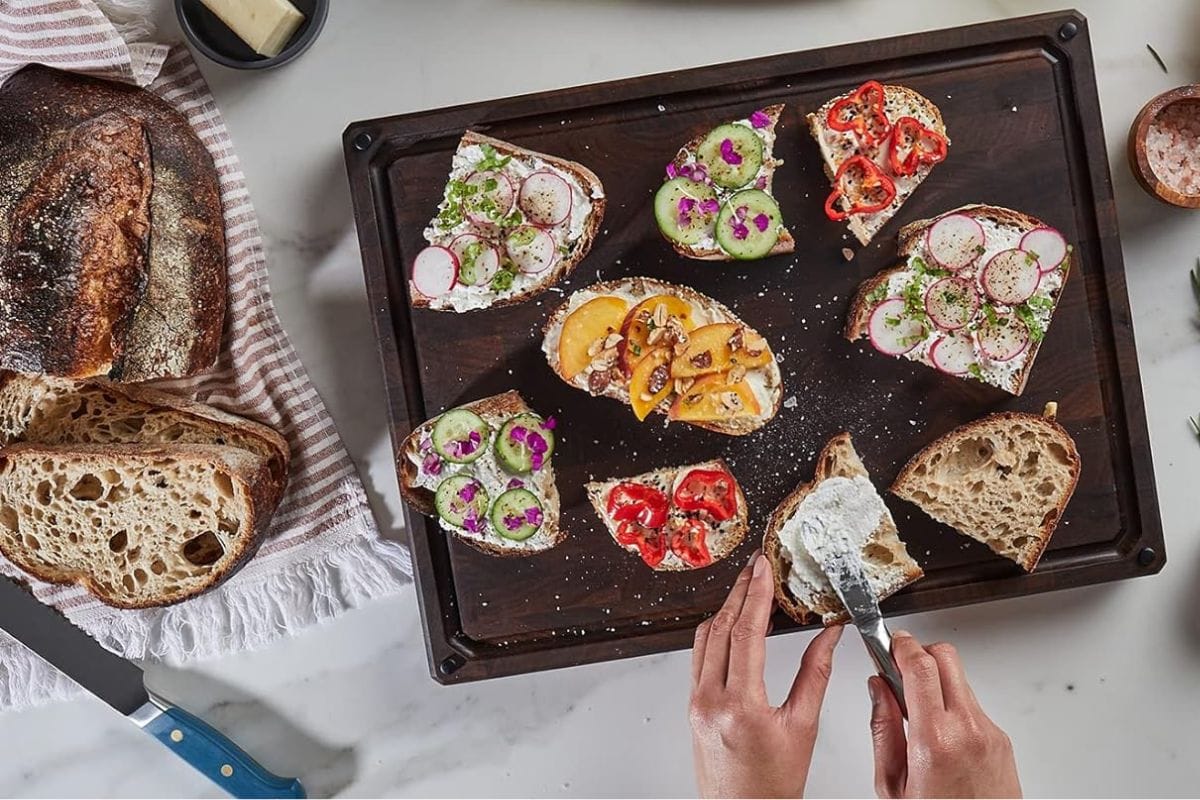
If you tend to be hard on your cutting boards, you may want to look for an end-grain design like this one. Its end-grain walnut construction can stand up to even the most vigorous chopping, and it won’t show as many knife marks, either.
This board has several features that make it extra useful in the kitchen. Removable rubber feet will keep it in place on your counter, and a deep juice groove around the edges traps runaway liquid. Plus, on the reverse side of the board, there are three built-in compartments that make it easy to keep ingredients separate while preparing to cook or when using the board as a serving tray.
The Specs:
- Dimensions: 17 x 113 x 1.5 inches
- Weight: 7.5 pounds
- Material: Walnut wood
- Grain: End-grain
The Pros:
- Durable end-grain construction
- Reversible design
- Removable rubber feet
- Compartments for food prep
- Deep juice groove
The Cons:
- Heavy
- Requires more frequent oiling
What Others Are Saying:
The Sonder Los Angeles End Grain Walnut Wood Cutting Board has more than 1,400 reviews on Amazon with a 4.7-star rating, and it was named one of the best cutting boards by The Spruce Eats.
Buy the Sonder Los Angeles End Grain Walnut Wood Cutting Board:
Other Wood Cutting Boards to Consider
Ironwood Gourmet Acacia Wood Cutting Board
The Ironwood Acacia Wood Cutting Board is another end-grain option that comes in six sizes, including options with or without a juice groove. This cutting board is made from acacia wood, and it has an attractive butcher block appearance, making it a good choice for servings as well as chopping. Because it’s an end-grain cutting board, it’s less likely to show knife marks, and there’s even a 3-inch thick option that’s sturdy enough to withstand aggressive chopping. Ironwood Gourmet Acacia Wood Cutting Board is available at Amazon for $113.53.
VBK Extra Large Walnut Wood Cutting Board
Many people like the dark appearance of black walnut wood, and this spacious cutting board is made from sustainable materials that are grown in America. There are four sizes to choose from, and all of them have a reversible design with a juice groove on one side. However, they are on the thinner side, so they may move around a bit as you chop. The VBK Extra Large Walnut Wood Cutting Board is available at Amazon for $180.
Shun Cutlery Hinoki Cutting Board
The Shun Cutlery Hinoki Cutting Board is a budget-friendly option for your kitchen. The medium size is just under 16 by 11 inches, and it’s crafted from a soft Japanese cypress wood that’s gentle on your knives. This cutting board is quite thin, making it lightweight and easy to store, but because it’s made from a soft wood, it’s not as durable as our top picks. The Shun Cutlery Hinoki Cutting Board is available at Amazon for $49.95.
Williams Sonoma End-Grain Cutting Board
If you hate when cutting boards shift around as you’re chopping, this option has non-slip feet that keep in steady on your counter as you work. (Of course, the downside is that it’s not reversible.) The board is a 12-inch square made from end-grain acacia wood, and while it doesn’t have handles, the elevated design makes it easy to pick up when you’re finished working. The Williams Sonoma End-Grain Cutting Board is available at Williams Sonoma for $79.95.
About Me
I’m Gina, the author and recipe developer behind Skinnytaste, which I started back in 2008. Over the past decade, I’ve spent most days creating and perfecting new healthy recipes to feature on the site and publish in my cookbooks, and I’ve spent a whole lot of time chopping ingredients on a cutting board.
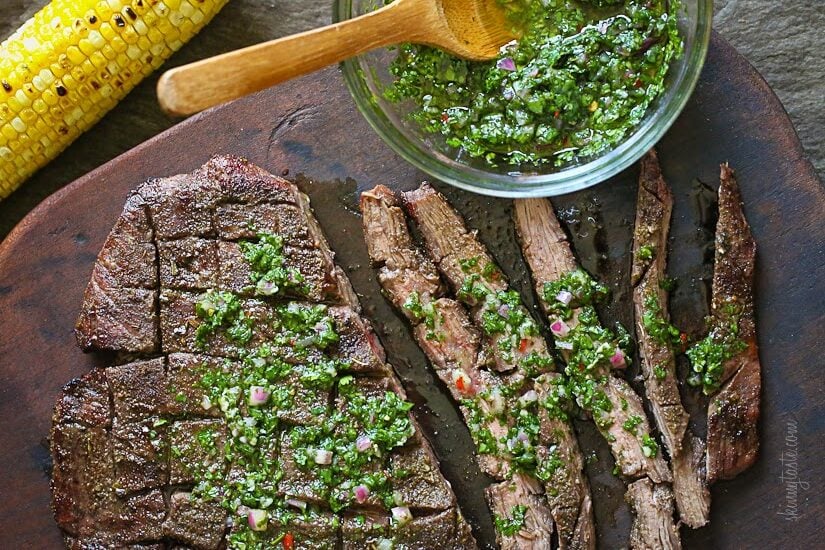
I know just how frustrating it can be if your cutting board warps or wiggles during use, so I’ve put together this list of the best wood cutting boards for your kitchen. I’ve tried out many of the products featured, and I love them for their sturdy, durable cutting surfaces. For any products that I haven’t used personally, I turned to recommendations from my favorite trusted cooking publications, as well as user reviews.
Everything to Know Before Buying a Wood Cutting Board
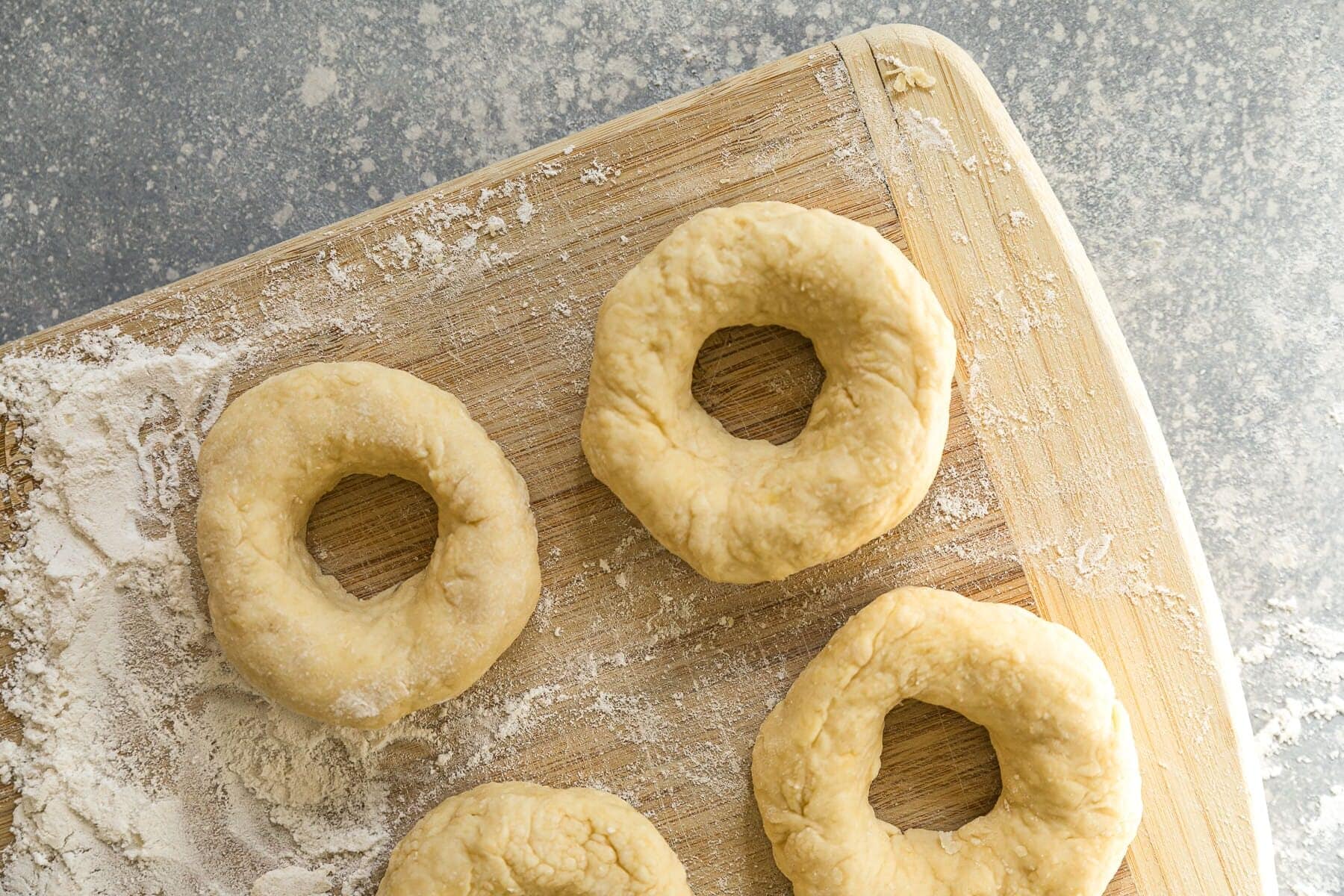
What to Consider Before Buying a Wood Cutting Board
Before you buy a wood cutting board, there are a few things you should know about the investment piece.
Material: Wood cutting boards can be made from a variety of materials. It’s best to look for a hardwood cutting board, such as maple, walnut, cherry, acacia, or teakwood, as these materials are the most durable.
Grain Type: When it comes to wooden cutting boards, there are two types of construction: edge grain or end grain. Edge-grain boards have wood fibers that run horizontally along the board, while end-grain products have wood fibers vertically. Edge-grain boards tend to be less expensive and easier to maintain, but end-grain cutting boards can withstand heavy chopping and can “self-heal” knife marks, keeping your board looking pristine for longer.
Features: There are a few useful features you may want to look for in a wooden cutting board. A juice groove around the edges is beneficial if you often carve meat or chop juicy fruit, and handles make a heavy cutting board easier to move. Other features to consider include a reversible cutting board or a model with non-slip feet on the bottom.
How Do You Clean a Wooden Cutting Board?
You don’t need to do anything special to clean your wooden cutting board after use. Just scrub it down with dish soap and warm water, then let it air dry before putting it back into storage. For a deeper clean, you can also rinse the board with a diluted vinegar solution. Whatever you do, though, don’t put wooden cutting boards in the dishwasher, which will dry them out and often cause cracking.
What is the Best Wood for a Cutting Board?
The best types of wood for cutting boards include maple, walnut, and cherry. These hardwood species are highly durable with small pores, which prevent moisture and bacteria from soaking into the wood. Teak and acacia are also a good choice and generally a more budget-friendly material, but they’re not quite as durable as the other hardwoods.
How Do You Care for a Wood Cutting Board?
Wooden cutting boards require a bit more care than plastic ones, but it’s not hard to maintain them. You’ll want to periodically oil your cutting with food-safe mineral oil. (Alternatively, many cutting board brands sell their own special oil blends.) This should be done every few weeks or any time the wood starts to look dry, and it will keep the board conditioned and prevent cracking.
Should You Use a Wood or Plastic Cutting Board?
While I personally prefer wooden cutting boards, there are benefits to both materials. Wooden boards tend to be sturdier and more durable, and wood is also a more sustainable material. On the other hand, plastic cutting boards are more affordable. Plastic boards also require less maintenance, and many can even be put in the dishwasher for hands-off cleaning.
The Best Chopped Recipes
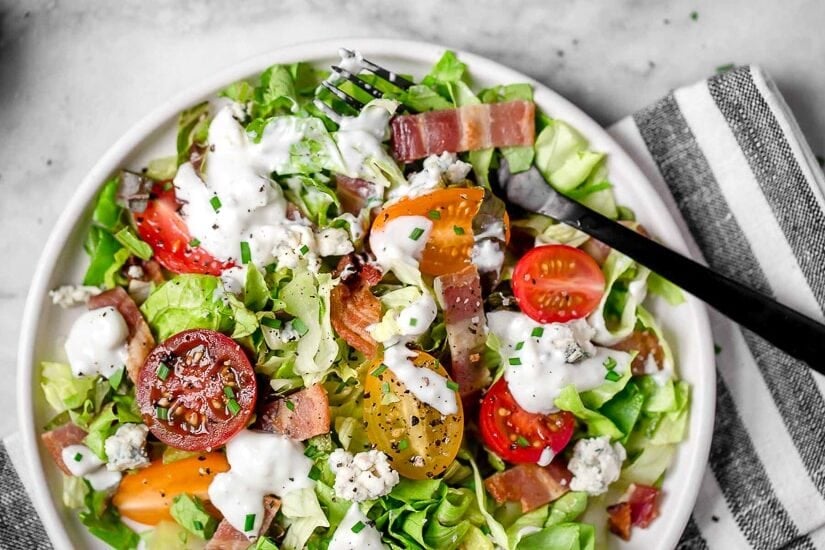
Cutting boards are a versatile tool in the kitchen. I use mine to chop produce, mince garlic, carve meat, and even serve appetizer spreads when I’m hosting. If you’re looking for delicious, healthy recipes to try out with your new wooden cutting board, here are some of my top picks that require a bit of chopping:
Prices were accurate at time of publication.





















+ There are no comments
Add yours